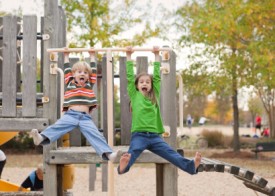
As early as first grade, a child’s social skills are a compelling predictor of his future success both in and out of school. Like any developing skill, burgeoning social skills require support, practice and repetition. The desired behaviors are learned and taught through a variety of accumulating experiences stemming from the earliest years of childhood, between birth and age 6, when children grow and develop faster than during any other stage in their lives.
Children rely heavily on adults and other caregivers to help them acquire social skills and establish pathways for meaningful learning. To that end, researchers have found that when children are provided with positive and caring experiences in these early years, the connections in the brain for feeling good and learning are strengthened, self-esteem and confidence rise, and children are more equipped to cope with life’s challenges.
So whether you’re a parent or an educator, the following strategies will help promote social development in young children, while helping them learn to use their own minds:
Model Appropriate Social Behavior
Take advantage of everyday routines to “show and tell” children what your expectations are for appropriate behavior—for example, how to greet someone new or how to share a toy during play. By talking about what you’re doing as you’re doing it the child will better understand how to manage the situation and replicate it, even when you’re not there.
Support Self-Esteem
Positive self-esteem is critical to healthy social development. Make it a point to compliment children on their behavior, how they look, and progress they have madetoward goals. When you acknowledge these attributes, children learn how to perceive and act upon their feelings in a healthy way.
Build Problem Solving Skills
Problem solving is a skill that employs reasoning, creativity, inhibitory control and decision making. Because children do not have fully mature executive functions, they are prone to making mistakes as their abilities emerge and the frontal lobe develops. Exploring solutions to problems by asking children “What would you do?” or offering alternative strategies will help them develop effective reasoning skills and mental flexibility.
Encourage Exploration
Infants and young children explore their environment through movement and interaction. As a child develops confidence and control over her body in motion, she becomes more and more eager to venture into the world around her. Aid her natural curiosity by organizing activities that promote safe exploration, both at home and while out. Examples include asking children for help while preparing a meal or tasking them with finding an item at the grocery store. When you gradually extend opportunities to be involved with more complex activities, children will rise to the occasion.
Play!
Time spent playing with children can be one of the best investments you make in their educational future. One of the easiest ways to help children develop socially is by the simple act of playing. Joining in play builds relationships in a climate of fun and puts you in a great position to teach skills for sharing and cooperation, introducing concepts like winning or losing, and it also gives children a chance to learn about more subtle social cues, like body language and vocal intonations. So don’t be afraid to turn up the music for a little song and dance, put on a puppet show, or pull out some favorite board games and have fun!
References:
Bierman, K.L., et al., Promoting academic and social-emotional school readiness: The Head Start REDI Program. Child Development, 79(6), 1802-1817, 2008.
Katz, Lilian and Diane McClellan. Young Children’s Social Development: A Checklist. World of Education. March 26, 2012.
Knitzer, Jane and C. Cybele Raver. What Research Tells Policymakers About Strategies to Promote Social and Emotional School Readiness Among Three- and Four-Year-Old Children. National Center for Children in Poverty. July, 2002.
Peters, Zrinka. Support Social and Emotional Development – Through Play!Education.com. March 26, 2012.
Supporting Social Development. Best Beginnings: Alaska's Early Childhood Investment. March 29, 2012.
Related Reading:
Building Your Child’s Self-Confidence
Recognizing Emotions After Brain Injury: Re-Learning a Critical Social Skill

